Local News
New documentary by Winnipeg filmmaker Yolanda Papini-Pollock exposes horrors of Falun Gong persecution in China
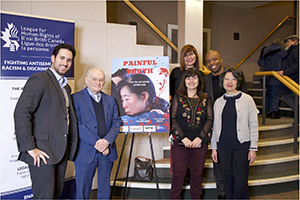
By MYRON LOVE
Genocide can take different forms. The Holocaust, for example, and the more recent Rwandan genocide were condensed in a frenzy of killing. For the Indigenous peoples of the Americas and Australia, the killing and attempted erasure of their cultures transpired over several hundred years.
Then, there is the matter of the Falun Gong.
Falun Gong (also known as Falun Dafa and Qi Gong) is a practice combining simple exercises with meditation based on the principles of truthfulness, compassion and forbearance.Of ancient Chinese origin, the practice – with the encouragement of the Chinese Communist government – developed a very large following in modern China. In 1999, however, Li Peng, chairman of the Standing Committee of the National People’s Congress, decided that practicing Falun Gong was a threat to the Chinese Communist government. He initiated a thoroughgoing campaign to demonize the practice and eradicate anyone who continued to practice the tradition.
The horrors of the ensuing persecution of Chinese Falun Gong practitioners have been effectively brought out in filmmaker Yolanda Papini-Pollock’s new documentary, “Painful Truth: The Falun Gong Genocide”, which the filmmakers premiered at the Berney Theatre on Thursday, January 9.
The half hour film demonstrates once again how easy it can be to demonize members of a segment of a population – who may stand out because of their ethnic origin, race, religious beliefs or sexual orientation. What is unusual about the Falun Gong is that the people being persecuted are ethnic Chinese – no different than their fellow Chinese citizens – who were simply pursuing an activity (non-political) that made them feel better physically and mentally.
“Painful Truth” is, in a sense, a follow up to Papini-Pollock’s “Never Again: A Broken Promise”, a documentary focusing on genocide that included interviews with Holocaust survivor Edith Kimelman, as well as survivors of the Rwandan genocide, Yazidi persecution and a former Residential school student.
It was at the premiere of that film that Papini-Pollock learned about the plight of the Falun Gong. One of those in the audience was Dr. Maria Cheung, Associate Professor at the Faculty of Social Work, University of Manitoba, herself a Falun Gong practitioner and survivor of the Chinese gulag, who brought up the issue.
How many practitioners of Falun Gong are there in China? By 1999, about 100-million Chinese were involved in the practice of Falun Gong. Jiang Zemin feared that this had become a cult that might threaten the rule of the Chinese Communist government.
Maria Cheung observed that dictatorships – such as Communist China – need to continually be creating new “enemies” to keep the people onside.
The evening began with a demonstration of Falun Gong exercises by ten practitioners dressed in colourful garments.
Then, through visuals and interviews with former Falun Gong prisoners who are now living in Canada, “Painful Truth” delved into the multimedia propaganda campaign against Falun Gong, the social shunning, the large scale arrests and torture and, worst of all, the murders of Falun Gong prisoners for their body parts for transplantation.
The Chinese government’s harvesting of organs from Falun Gong prisoners was first exposed by Winnipeg’s own David Matas, a world leader in the fight for human rights, who, in 2009, in partnership with former Member of Parliament David Kilgour, released “Bloody Harvest: The Killing of Falun Gong for Their Organs”.
Both Matas and Cheung appeared on stage after the screening of the documentary to answer questions about the persecution of the Falun Gong. Matas explained that he learned about the Chinese Government’s organ harvesting through encounters he had as an immigration lawyer with Chinese immigrants to Canada who had been imprisoned for their practice of Falun Gong.
“They would talk about the torture, but also mention how they were subject to frequent blood tests and examinations of the health of their internal organs,” he says. While there are no public records or eye-witness accounts of Chinese organ harvesting from Falun Gong prisoners (whose bodies would have been cremated), Matas and Kilgour extrapolated from organ transplant figures from before 1999 and after.
Matas noted that China does not have a tradition or history of organ donation. Before 1999, he said, it was well known that the Chinese Government removed the organs of prisoners who were executed for the small number of organ transplants that took place. After 1999 – and the beginning of the arrests of Falun Gong practitioners, the number of organ transplants increased exponentially.
What has been the world’s response to the exposure of this sordid crime against humanity? Matas noted that Israel was a world leader in responding to this issue. Israel was paying all the expenses for Israelis travelling to China for organ transplants. After learning of the source of the transplanted organs, the Israeli government cut off insurance for organ transplants in China, criminalized participation in organ abuse abroad, set up an inspection system to check if Israeli hospitals are bringing in organs from outside the country and changed the rules so that people who know they are dying can choose to donate their organs for transplant after their passing.
He adds that 14 other countries – including Canada – have also passed or are in the process of passing rules monitoring the origins of organs for transplants.
The premiere was co-sponsored by Winnipeg Friends of Israel (which Papini-Pollock co-founded four years ago) along with B’nai Brith Canada and its League for Human Rights.
Local News
New Israeli restaurant opens in River Heights

By BERNIE BELLAN (July 6, 2025) It’s been a long time since our community has been able to welcome the opening of a restaurant that specializes in Israeli food.
That void is now going to be filled with the opening of The Green Falafel, at 1833 Grant (corner of Centennial – next to the Subway).
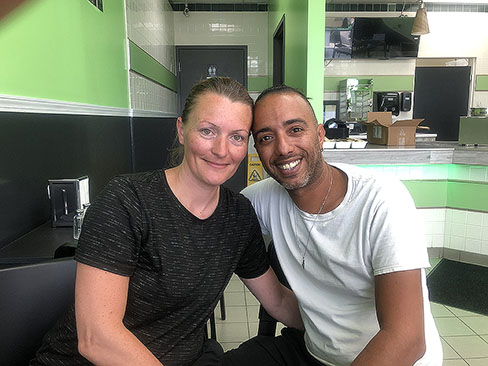
The restaurant is the fulfillment of a dream long held by the husband and wife team of Ariel and Eden Maudi, who have been living in Winnipeg the past 11 years.
Ariel, who was born in Israel and grew up in Beer Sheva, says that he worked in telecommunications in Ramat Gan for several years. He adds though that he had always dreamed of owning his own falafel stand in Israel, but life was difficult there and he decided to come to Canada as a tourist to see whether there were any opportunities here for him, Eden and their two young children.
Eden, who was born in Russia and moved to Israel with her family in 1996, stayed behind with the two kids, who were both pre-schoolers, while Ariel tested the waters in Canada first.
Ariel says he came to Canada as a tourist in 2013. His first stop was in Toronto, where he acquired his 1st class driver’s license. At the end of 2013 he moved to Winnipeg where he began working as a truck driver. Soon he found himself employed as a successful sales person at Vickar Nissan where, he says, he once achieved the status as the top car sales person in Canada. After working at Vickar Nissan for a number of years, Ariel began working as an installer for Bell MTS.
Meanwhile, Eden began working at a Walmart, later at the Costco on Regent.
But, when the opportunity to move into a space that had been previously occupied by another restaurant, but which had closed, became available, Ariel and Eden decided to open their own Israeli restaurant in an area that hadn’t seen Israeli food served since the controversial closure of Bermax Café in 2019.
The Maudis say that they will be serving a variety of Israeli dishes – all vegetarian, and that they will be fully kosher.
The “green” in Green Falafel, by the way, Ariel Maudi explains, comes from the cilantro and parsley that are added to the chickpeas. In addition, their pitas will be coming from Israel and will be baked fresh daily.
The Green Falafel will be open from 10-8 daily. Delivery will be available through Uber Eats and DoorDash.
Call 204-557-7837 for information.
Local News
Previews of shows with Jewish performers at this year’s Fringe Festival July 16-27

For show dates and venues go to winnipegfringe.com
By BERNIE BELLAN As has been our custom for many years now we try to find shows that have either Jewish performers or themes that would have particular appeal for Jewish audiences. Many of the Jewish performers at this year’s festival have been here before, but several are new. In no particular order here are blurbs about the shows we’ve found that fit the criteria I’ve just described. (By they way, if we’ve omitted a show that should be included in our list there’s plenty of time to get added to this post. Just drop me a line at jewishp@mymts.net.)

You’ve Been Served: A One-Woman Show About Divorce, Cults, and Coming of Age at Midlife
Noemi Zeigler
You are hereby summoned… to laugh, cry, and maybe belt out a Streisand number in solidarity. You’ve Been Served is a raw and riotous solo comedy by writer-performer Noemi Zeigler. It all begins when Noemi is served divorce papers on top of a garbage bin lid while taking out the trash—an undignified start to a full-blown midlife unraveling.
At 50, still clinging to her dream of becoming a singer, she falls under the spell of a music producer slash self-help guru, joins a spiritual cult, and, instead of landing a record deal, she lands in jail. Behind bars, with help from her long-buried inner child, she begins to reclaim her voice and her power. Turns out, dreams really do come true—just not the way she expected.
The show features vividly drawn characters—including a manipulative cult leader, a toxic ex-husband, and a jail guard named Roach who shares Noemi’s obsession with the fashion of Charlie’s Angels (the ‘70s TV version, of course.)
With salsa dancing, twerking, and a belting rendition of Don’t Rain on My Parade, Zeigler dives into abandonment, reinvention, and self-rescue. As she confronts perimenopause, she discovers it’s not the end—it’s the new puberty. The show touches on grief, sexuality, and spiritual confusion, but Noemi’s childlike optimism asks: What if your breakdown is actually your breakthrough?

You’re good for nothing… I’ll milk the cow myself
Written & Performed by Natacha Ruck
France, 1981: The first socialist president is about to be elected and young Natacha is ready to implement her own political platform. But first, she has to take down the schoolyard bully,emasculate the rules of French grammar and make off with grandmother’s chocolate.
If you think you know the limits of Jewish mothers, evil grandmothers and transcontinental lovers, meet Natacha Ruck’s family. This true tale of three generations of women, facing three world wars, is equal parts hilarious, shocking and zany.

A One Human Being, Potentially Comedic Performance of Beauty and the Beast NEW WORK!
Written & Performed by Alli Perlov
Be our guest! Local high school drama teacher Alli Perlov is back for a tale as old as time. Can she sing? Not really. Can she act? That’s debatable. Will you laugh? Oh… probably.
Perlov plays dozens of characters, some human, some animal, and many objects, in a comedic exploration of Beauty and the Beast.
In an homage to this brilliant musical adventure, through witty commentary and unstoppable energy, Perlov aims to entertain an audience that isn’t forced to be there like her students.

Hockey Sticks and Beaver Pie
Written & Performed by Melanie Gall
Take a trip around Manitoba. From the 30,000 ft. St. Adolphe snow maze to the Narcisse snake dens! After all, where else holds both the title of Slurpee Capital of the World and the Guinness Record for the most people simultaneously howling like wolves?
Deanna Durbin, Terry Jacks and Burton Cummings are among the many homegrown stars, and Hockey Sticks features their music along with original songs and the stories that make this province unique.
Starring Melanie Gall from past shows Piaf & Brel, Ingenue and Toast to Prohibition
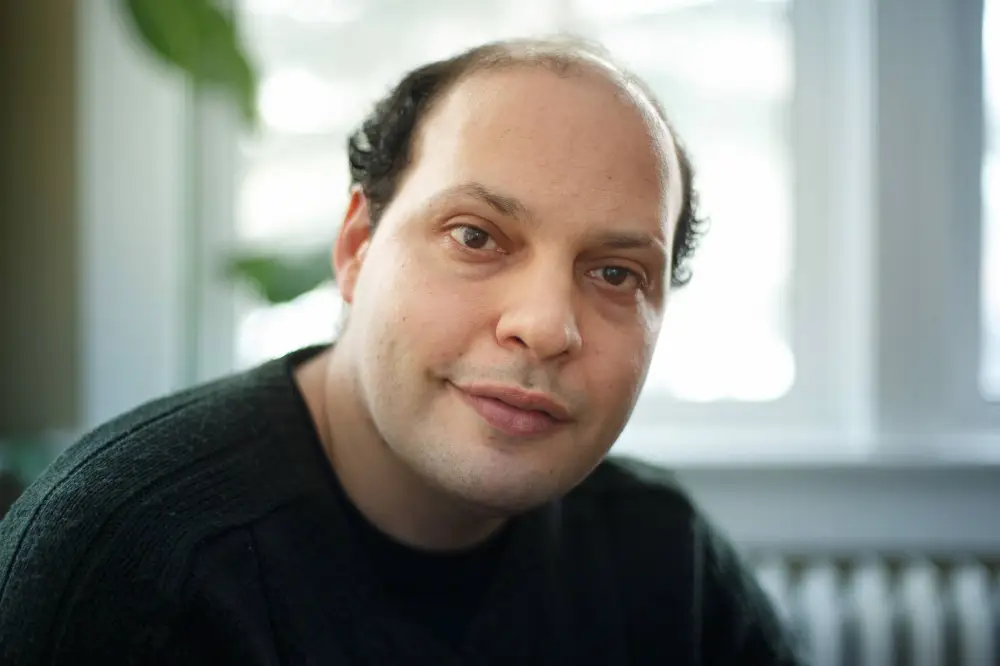
Nerohilarity Exposed
Produced by Adam Schwartz
We all sometimes feel exposed, whether that’s as a fraud or a pretender.
The performers of the award-winning Neurohilarity show, Danielle Kayahara (Laugh Out Loud CBC), Carole Cunningham (Yuk Yuks, The Debaters), Adam Schwartz (Winnipeg Fringe) and Rollin Penner (Yuk Yuks, CBC, Rumors, Winnipeg Comedy Festival), apply a comedic spin to the experiences that make us feel insecure, stripping away the emotional weight with nittygritty jokes and stories that will have you laughing uproariously.
Brilliantly awkward.
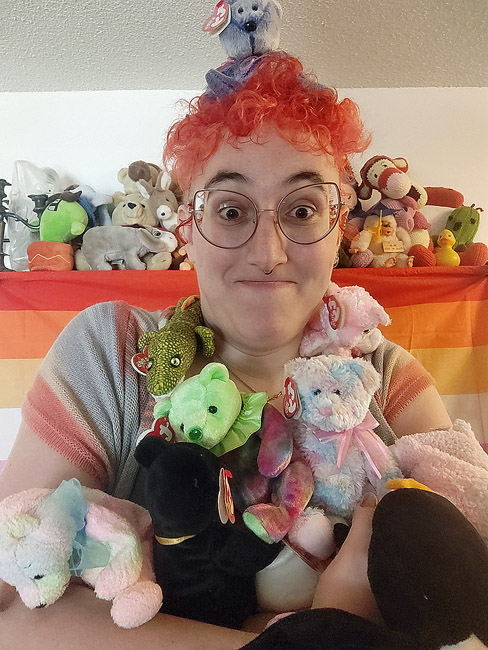
A Lesbian in the Kitchen
Willow Rosenberg
Professional lesbian Willow Rosenberg takes you on a journey through the centuries, superstitions and tablespoons of her lifelong passion for baking in this spiritual successor to 2024’s Jenny Award-nominated A Lesbian in a Bear Store.
Whether you have a favourite spatula, bake once or twice a year, or live in constant fear of being told to “just fold it in”, this one-woman show about family, joy, tradition (but make it gay),
Judaism, comfort, home (but make it gayer*), love, chemistry and magic is for you!
*Who’re we kidding, it’s all gay!

Eleanor’s Story: An American Girl in Hitler’s Germany
Written & Performed by Ingrid Garner
(Ed. note: Although Ingrid Garner isn’t Jewish, we thought the theme of this show might have a special appeal for Jewish readers.)
Based on Eleanor Ramrath Garner’s best-selling memoir, this 16x internationally award-winning adaptation – performed by her granddaughter, Ingrid Garner – details Eleanor’s youth as an American caught in Second World War Berlin.
Punctuated with humour and accompanied by cinematic sound and video, Garner embodies her ancestors in this coming-of-age odyssey, delivering an account of war that is more relevant than ever.
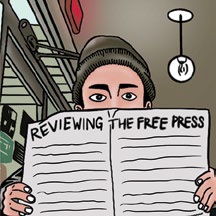
Reviewing The Free Press 2
Benji Rothman
The Winnipeg Free Press has run amok, reviewing each and every Fringe show over the past two decades without consequence or recourse. Now, it’s their turn… again.
In this refurbished work that debuted at last year’s Winnipeg Fringe, Benji Rothman once again takes the Winnipeg Free Press to task. In this (mostly) new, (hopefully) hilarious 45-minute show, Rothman dives deep into their past and exposes their faulty journalism, imbalanced reporting and, of course, embarrassing typos.
Local News
Jewish performers at this year’s Winnipeg Folk Festival July 10-13

The Black Sea Station
Long ago, there were the klezmorim, itinerant musicians who roamed the back streets of Eastern Europe, playing at parties for meals and a few coins. The sound they honed then was a visceral exploration of life’s joy, and its loss; they could whip audiences into a frenzy of dancing, or bring them to tears with the mournful wail of a clarinet. Today, Winnipeg’s own The Black Sea Station is carrying on this tradition. Featuring Daniel Koulack (bass), Victor Schultz (violin) and Myron Schultz (clarinet) — cofounders of seminal local klezmer act Finjan — along with Moldovan accordion wizard Nikolai Prisacar and multi-instrumentalist Ben Mink, the quintet transports listeners to a time and place long past. Through a mix of original songs rooted in history, and traditional tunes spun up with modern zest, they whirl through the exuberant klezmer sounds of their Eastern European heritage, tending the old ways with deep love and respect.
The Black Sea Station will be performing Sunday, July 13, at 1:00 pm in Snowberry Field.
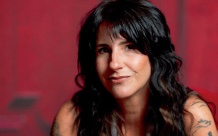
Romi Mayes
Romi Mayes has taken some hard knocks in her life, but she’s never faded away. For more than 25 years, Manitoba’s first lady of blues-rock has been a lynchpin of the Canadian roots scene. She earned that position the old-fashioned way, through her gritty, passionately emotive music. With her sizzling guitars and full-throated rasp, the Juno-nominated performer howls and purrs through razor-edged lyrics, rocking out wherever she can find a stage. She’s long been one of the hardest-working musicians on the circuit, keeping a busy slate of gigs and mentoring up-and-coming artists to get a foothold on the trails she blazed. Now, after a nine-year hiatus from the studio, Mayes has put her scintillating sound back on record with her long-awaited seventh album, Small Victories — a return that leaves no doubt, no matter the ups and downs, Mayes is here to stay.
Romi will be performing Friday, July 11, at 1:00 pm in Burr Oak.

Leonard Podolak (with Matt Gordon)
Ireland’s Matt Gordon is a fiddler and singer, whose fleet-footed clogging and thigh-slapping hambone has taken stages by storm since the 1980s. Leonard Podolak is a virtuosic master of the clawhammer banjo, who for decades has whipped up some of Manitoba’s wildest roots parties with his band, The Duhks. Put those talents together, and they can promise you this much: we’re all gonna have a real good time. Longtime friends and musical collaborators, Gordon and Podolak deliver an exhilarating trip through old-time Appalachian music. Their performances seamlessly blend intricate instrumental lines with heartfelt singing and dazzling dance. They’ve teamed up on a few records over the years, including 2020’s bigband extravaganza Power Wagon: Live At Shanley’s. But the best way to experience this duo’s toe-tapping, hand-clapping chemistry is to see it live.
Podolak and Gordon will be performing A concert with a side of clogging Sunday, July 13, at 3:00 pm in Folk School.
